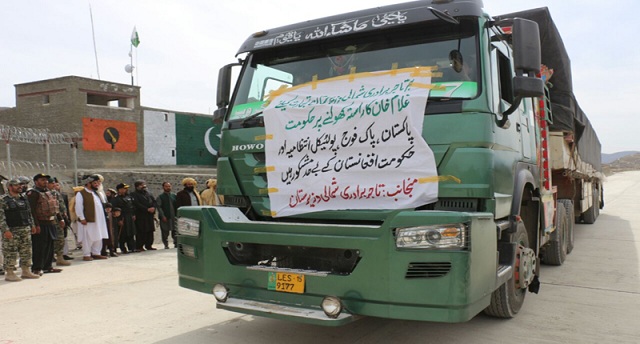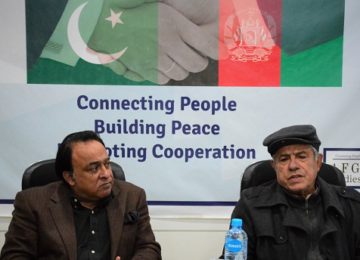Tensions bring down trade from $2.5 billion to $1.4 billion: delegates
Pakistani and Afghan traders are developing a cross-border stakeholders’ policy advocacy draft for reducing trust deficit and enhancing economic connectivity across the border.
Businessmen from both countries, who met in Islamabad on Monday, sought meetings with the Afghan President Ashraf Ghani, Prime Minister Shahid Khaqan Abbasi and and the Army Chief General Qamar Javed Bajwa for deliberating on the proposed strategy for incorporating strategic insight and facilitate the issues hampering the historical ties between two brotherly nations.
The Pakistan Afghanistan Joint Chamber of Commerce & Industry (PAJCCI) conducted the day-long round-table meeting to nurture the environment of trust and facilitate initiation of table talks between the two countries for peace and economic prosperity across the border.
It was also highlighted that these worsening relations have also affected trade of Pakistan with Central Asian countries and has a devastating impact on the local economy.
The participants pointed out that despite having potential of $5 billion, lately trade has fallen from $2.5 billion to $1.4 billion because of bilateral tensions that caused other countries to penetrate in Afghanistan easily, as India has recently acquired a very strong hold both socially and economically in the Afghanistan, causing double damage to the Pakistani economy and neighborly relationship.
Additionally the recent figures are showing a rise in Afghanistan’s trade with Iran (both transit and bilateral) and a corresponding decline in business with Pakistan due to disturbing political ties accruing since long.
Zubair Motiwala, Chairman PAJCCI told the delegates that Karachi is the most economical route for Transit Trade for Afghanistan; however, Iran’s facilitation to Afghan businessmen is pulling the business away.
He urged both the governments to consider the effects of recent political turmoil over bilateral and transit trade whereby Pakistan-Afghanistan trade has dropped significantly in the last 2-3 years.
The meeting was attended by representatives from chambers, think tanks, embassies, relevant ministries and the business community.
Motiwala emphasized that only fiscal reforms and rationalizing of tariffs will curb the tendency towards parallel trade and enhance the mainstream trade. “That would not only improve the deteriorating trade balance of Pakistan with Afghanistan, but would also help wiping off the prevailing current account deficit of Pakistan.”
“Frequent border closures, heavy demurrages, waiting time, uncertainty and diversion of both bilateral and transit trade to other avenues is causing psychological rift and is resulting in long-run instability in relations with the prime neighbor of Pakistan,” he said.
He once again requested the Ministry of Commerce and Finance ministry to consider the appeal of PAJCCI for waiver of any applicable port charges (detention / demurrage) applied to Afghan consignments / containers accruing from the closure of the border to limit the monetary losses of the business community.
Motiwala also brought to light the issue of regulatory duties imposed on imports from Afghanistan, and requested it to be waived for the better connectivity amongst the neighboring countries.
The Chairman PAJCCI further requested for convening a meeting between private sectors and government officials of both the countries for facilitating them in reconnecting with each other and identifying common grounds of peace, prosperity and strong economic ties.
He mentioned that recent SRO issued by the Food and Security department to present health standard certificates (Quarantine Certificate, Afloxine test, Form A, import permit etc) on the Agri products (820 types of items) being imported to Pakistan have significantly affected the Afghan exporters by causing heavy losses because thousands of tons of cotton, Fresh fruits vegetables are stranded at the border.
The concerned tests and certificates are not applicable in the region and also getting the import permit for Afghan businessmen would be challenging due to Quarantine office being located in Karachi only.
He strongly urged the Ministry of Commerce to facilitate Afghan traders in this context and develop policy for facilitation without causing any procedural violence at our end, or may consider the routine quarantine certificate issued by Ministry of Agriculture of Afghanistan to save the Afghan exporters from distress at this time of their exports.
The Chaman and Gawadar chambers insisted that it is not possible to provide all these certificates of Afghan imports and to issue test reports of perishable goods on priority basis as the goods are under heavy transport detentions charges and by nature perishable. Additionally the infrastructure support is critically limited and in this season of Afghan exports especially of fruits that would have demoralizing effect on the traders.
The participants also highlighted difficulties faced at borders due to ineffective facilitation and deteriorating infrastructure. The deliberations also focused upon possible solutions for mutually beneficial results.
Deputy Afghan ambassador Zardasht Shams supported the PAJCCI efforts to reduce mistrust and boost bilateral trade activities and said that this can be helpful for the betterment of relations on both the sides.
“This forum can enhance the business, commerce and trade of both countries by de-politicization and contribution of PAJCCI in ensuring the same is commendable. On behalf of Ambassador he ensured support from the office for finalizing this process and leading the negotiations on right track,” he said.
This article originally appeared on Daily Times on March 28, 2018. Original link.
Disclaimer: Views expressed on this blog are not necessarily endorsed or supported by the Center for Research and Security Studies, Islamabad.








